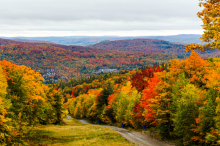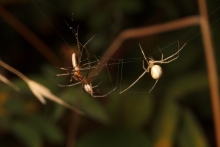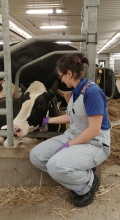Federal funding program supported 59 research projects in cleantech, astrophysics, medtech, and more.


From health and disability law to the emerging field of regenerative medicine, seventeen McGill scholars named to new or renewed Canada Research Chairs positions across diverse fields

The latest Canada’s Food Guide presents a paradigm shift in nutrition advice, nixing traditional food groups, including meat and dairy, and stressing the importance of plant-based proteins. Yet, the full implications of replacing animal with plant protein foods in Canadians’ diets are unknown.

The latest Canada’s food guide recommendations are primarily aimed at reducing chronic disease risk, however how well does our national guide for healthy eating serve the nutritional needs of all Canadians?

Halloween is a celebration often spent indulging in chocolate, binging scary movies, and perhaps investing time and money into creative costume designs. But for many Canadians, the preparations can be costly. For candy alone, the average household will spend anywhere from $25 to $40, according to experts. (CTV News)
Here is an expert from McGill University that can provide comment on this issue:

The customary reds, oranges and yellows of the trees, marking the arrival of fall, may have appeared early this year, or not at all. The dramatic summer weather that brought wildfires in some parts of the country and heavy rain in others is being reflected in fall colours across Canada, researchers say.

Both elegant and fierce, killer whales are some of the oceans’ top predators, but even they can be exposed to environmental pollution. Now, in the largest study to date on North Atlantic killer whales, researchers in the American Chemical Society’ Environmental Science & Technology report the levels of legacy and emerging pollutants in 162 individuals’ blubber. The animals’ diet, rather than location, greatly impacted contaminant levels and potential health risks — information that’s helpful to conservation efforts.


Residential energy use represents roughly one-fifth of annual greenhouse gas emissions in the United States. A team of researchers led by McGill University has used data from 60 million individual American households to look into how carbon emissions caused by household energy use vary by race and ethnicity across the country. Paradoxically, this first national level analysis found that even though energy-efficient homes are more often found in Caucasian neighbourhoods, carbon emissions from these neighbourhoods are higher than in African American neighbourhoods.

Today, the Fonds de recherche du Québec - Nature et technologies (FRQNT), along with its partner the ministère de l'Agriculture, des Pêcheries et de l'Alimentation (MAPAQ) announced the creation of the Réseau québécois de recherche en agriculture durable (RQRAD), a flagship measure of the Plan d’agriculture durable 2020-2030 (PAD).
Today Genome Quebec announced the results of its Genomic Integration Program, Human Health Stream competition. Five McGill teams from a diverse array of fields were awarded funds, totaling nearly $1 million. One of the defining features of this program is the requirement that institutional applicants must also have an external non-academic partner, thus supporting program goals of stimulating the Quebec economy and encouraging the use of genomic technologies in the Quebec healthcare system.

Milk is the main source of vitamin B12 consumption for Canadians. A glass of cow’s milk contains about 46% of the daily-recommended dietary intake of vitamin B12 for adults. But what factors influences the concentration of B12 in a glass of milk? Turns out, what cows eat and how they digest it can impact human’s B12 intake.

Image caption: These killer whales may appear healthy, but a new study has found extremely high levels of PCB contamination in some of the whales. There was a 300-fold difference between the levels of PCBs among the most contaminated orcas compared to the least contaminated ones. The variation was mainly due to their eating habits. CREDIT: Filipa Samarra - Icelandic Orca Project

In a world as diverse as our own, the journey towards a sustainable future will look different depending on where in the world we live, according to a recent paper published in One Earth and led by McGill University, with researchers from the Stockholm Resilience Centre.

We were thrilled to learn that several members of the McGill-Macdonald Campus community were selected from more than 800 applicants to sit on the Canadian Agricultural Youth Council.
